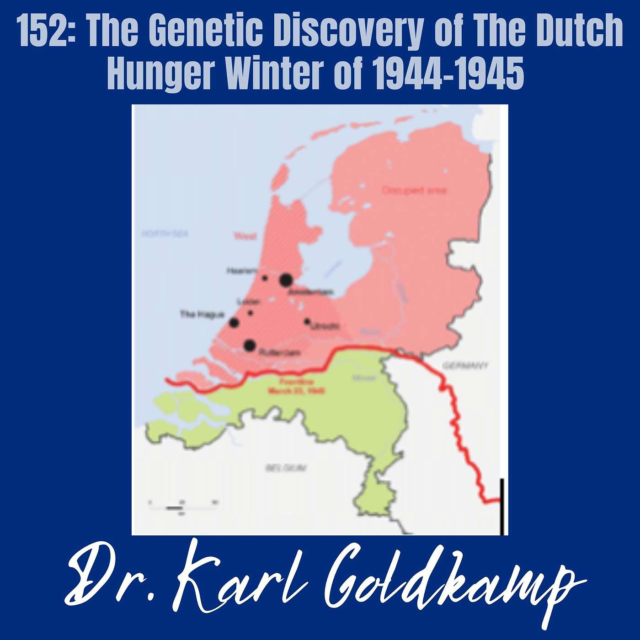152: The Genetic Discovery of The Dutch Hunger Winter of 1944-1945

Never before in history has there ever been such a well-documented, yet devastating, famine that affected so many people. In the Dutch Hunger Winter of 1944-1945, food got shut off for 4.5 million people of all classes for seven months. The caloric intake dropped to 450 calories per person. Then, almost instantaneously after the war ended, everyone had all the food they needed.
The effects of that on that entire population got tracked for a generation. The children born to pregnant mothers were affected, and so were their children and their grandchildren.
That horrible and protracted act of inhumanity became the birthplace of epigenetics.
Legacy
The legacy of the famine of the Dutch Hunger Winter was a well-documented experience that has helped scientists to measure the effects of famine on human health. It became known as the Dutch Famine Birth Cohort Study.
The findings of the Dutch Famine Birth Cohort Study
This study found that most children of pregnant women exposed to famine were susceptible to diabetes, obesity, cardiovascular disease, and hypoproteinemia (not enough protein in the blood).
Smaller than average
As expected, the children of the women who were pregnant during the famine were born smaller. Surprisingly, however, as those children grew up and had children, their children were also thought to be smaller than average.
Epigenetic changes
Data suggests that the famine experienced by the mothers caused epigenetic changes. Those changes got passed down to the next generation.
Famine survivors
In the 1960s, researchers began to study the famine survivors. They all had the usual complications. The fetuses in the third trimester during the height of the famine had very low birth weights. Although they grew up to be normal, they later suffered from high rates of diabetes.
Fetuses exposed to famine
Fetuses exposed to famine during gestation also developed more COPD (Chronic Obstructive Pulmonary Disease) and kidney diseases later in life.
Those whose mothers starved at the beginning of the pregnancy have more atherosclerosis, altered blood-clotting, hyper-inflammation, obesity, and a threefold increase in cardiovascular disease.
Daughters of the mothers who were pregnant during the famine, who were born after the famine was over, were significantly more diabetic and obese in midlife than were average men. The men had higher rates of schizophrenia and exaggerated stress responses.
You are not what you eat
The evidence to prove that you are not what you eat is building steadily. You are more likely to be affected by what your grandmother ate. Or by what she did not eat.
A question
How could a body remember an environment in the womb decades later? One study suggested that the Dutch Hunger Winter silenced some genes in unborn children, and those genes have never been active since then.
A conclusion
Researchers can now get some clues as to how other kinds of stressors can reprogram children’s health, even before they are born.
Links:
Join Our Facebook Group Keto Naturopath
Subscribe to our YouTube Channel
Download our Free Keto Foods List
Visit our partners
Buy Keto Friendly Dry Farm Wines
Get your KetoMoJo Here and test your ketones.
Article: The Dutch Hunger Winter and the developmental origins of health and disease
